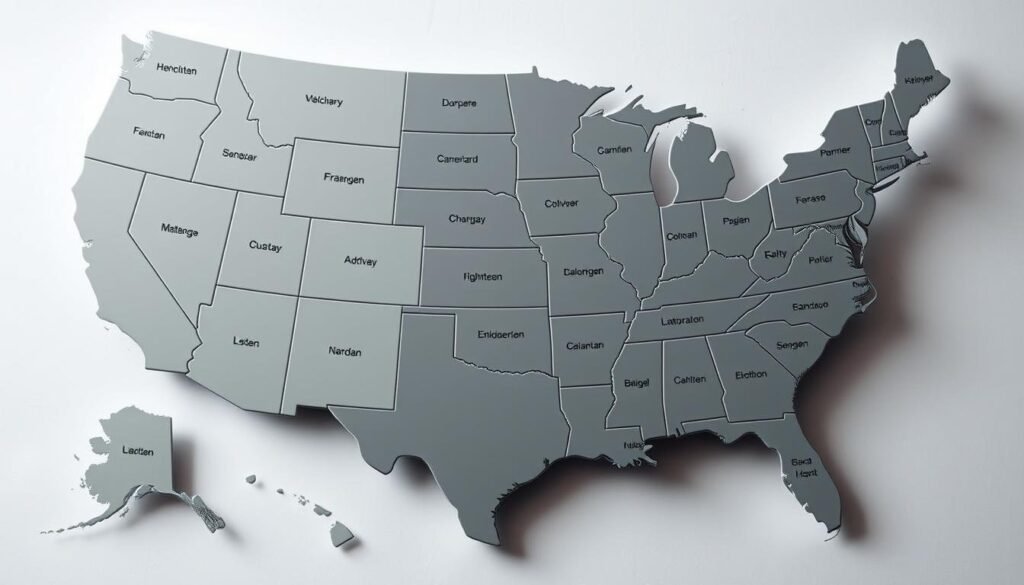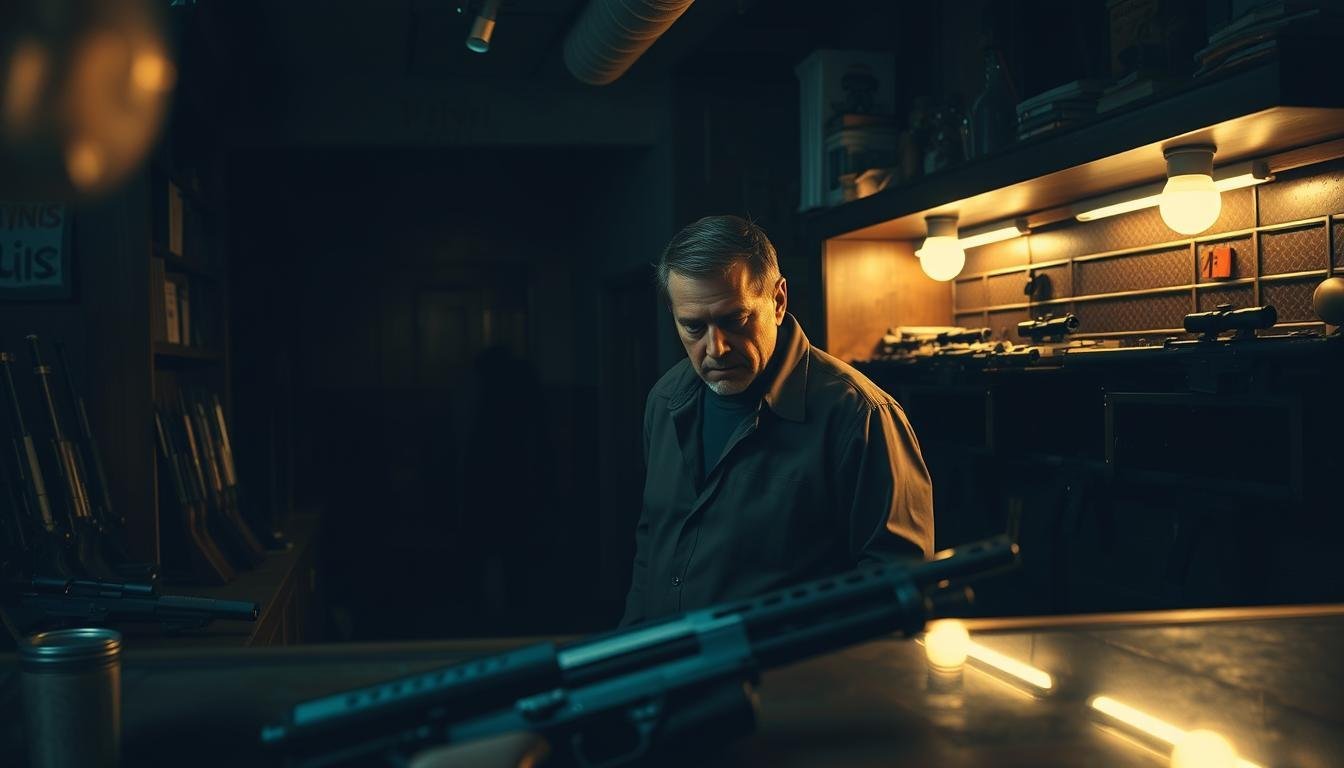Last updated on October 7th, 2025 at 07:20 am
Can Felons Work in Gun Shops? If you’re looking into jobs in the firearms world, you might wonder about felon gun shop employment laws. These laws are complex, mixing federal rules with state-specific rules.
Federal laws limit some people from working with guns. But, there are exceptions and details that could affect your chances for gun shop jobs.
This article will help you understand federal laws on felons and guns. We’ll look at your options and the challenges you might face in this career path.
Contents
- 1 Federal Laws Regarding Felons and Firearms
- 2 Can a Convicted Felon Work in a Gun Shop?
- 3 Exceptions and Rights Restoration
- 4 State-by-State Variations in Gun Shop Employment Laws
- 5 Alternative Career Paths in Related Industries
- 6 Conclusion: Can Felons Work in Gun Shops?
- 7 FAQ
- 7.1 Can a felon work in a gun shop if they have had their rights restored?
- 7.2 Are there any states that allow felons to work in gun shops?
- 7.3 Can a felon work in a gun shop if they are not handling firearms?
- 7.4 What are the implications of federal law on felons working in gun shops?
- 7.5 How can a felon determine if they are eligible to work in a gun shop?
- 7.6 Are there alternative careers for felons who are interested in the firearms industry?
- 7.7 Can a felon’s rights be restored after a certain period?
Federal Laws Regarding Felons and Firearms
If you’re a felon wanting to work in a gun shop, you need to know the federal laws. These laws are in place to keep felons out of certain jobs in the firearms world.
The main law is the Gun Control Act (GCA) of 1968. It says felons can’t ship, transport, receive, or own guns. This rule is for all kinds of felonies, not just violent ones.
These laws mean big things for felons trying to get jobs in gun shops. Here are some important points to think about:
- Felons can’t handle or own guns, which limits job choices in gun shops.
- Breaking these laws can lead to federal charges, showing how serious they are.
- Background checks are part of the hiring process in gun shops. They can find out if someone has a felony.
It’s also key to remember that states have their own rules on felons and guns. Knowing both federal and state laws is important for felons wanting to work in the firearms field.
In short, federal laws on felons and guns affect jobs in gun shops for felons. Knowing these laws and their effects is crucial for those in the firearms industry.
Can a Convicted Felon Work in a Gun Shop?
If you’re a convicted felon, finding a job in gun shops can be tough. This is because laws stop felons from handling guns.
The firearms world is very strict. Laws say felons can’t own or touch guns.
Sales vs. Administrative Duties
Gun shops have different jobs. Some are about selling and helping customers. Others are about paperwork and support.
Sales roles mean you work with guns. This is a big no for felons because of the law.
But, administrative duties like managing stock or doing paperwork might be open to felons. These jobs don’t involve guns.
It’s key to know some jobs in gun shops are okay for felons. But, others are not allowed.
Jobs that need you to handle guns or ammo are off-limits to felons.
But, jobs that are more about paperwork or helping out might be a chance for felons to get into the industry.
- Administrative roles might include tasks like inventory management or customer service.
- Support duties could involve maintenance or security tasks that do not require handling firearms.
When looking for jobs in gun shops, check the job’s needs and rules carefully.
Knowing the law and your rights can help you find your way in this complex field.
Exceptions and Rights Restoration
Getting a job in a gun shop after a felony is tough. You need to know about restoring your rights. If you’ve been convicted of a felony, you might be able to have your rights back. This could let you work in the firearms industry.
The way to get your rights back changes a lot. It depends on where you live and what you were convicted of. Federal laws on felons and firearms say people with felonies can’t have guns or work with them. But, there are ways to get your rights back.
The Process of Rights Restoration
To get your rights back, you need to go through a legal process. This can include:
- Applying for a pardon or clemency
- Seeking an expungement or record sealing
- Requesting a restoration of firearm rights specifically
Each step has its own rules and challenges. For example, getting a pardon means showing you’ve changed and are now law-abiding.
If you get your rights back, you might be able to work in a gun shop. But, you must remember that federal and state laws still apply. Even with your rights restored, some jobs in the firearms industry might still be off-limits.
Also, think about what kind of felony you were convicted of. Some crimes, especially violent ones or those involving guns, might face stricter rules or bans.
For help with these complex issues, talk to a lawyer who knows about firearms laws and rights restoration. They can give advice that fits your situation and explain what might happen.
In short, having a felony conviction makes it hard to work in a gun shop. But, getting your rights back could be a way in. Knowing the legal steps and what they mean is key for those trying to get back to work in this field.
State-by-State Variations in Gun Shop Employment Laws
If you’re a felon wanting to work in a gun shop, you must know the state laws. These laws change a lot from state to state. It’s a tricky issue to understand.
In some places, like California, felons can’t work in gun shops. California’s laws are strict because they don’t want felons near guns.

But, Texas has different rules. Even though federal laws still apply, Texas might let felons work in gun shops. They just can’t handle the guns themselves. It’s important for felons to know these details.
In New York, the rules are even tighter. There are tough background checks and licenses needed. This makes it hard for felons to get jobs in gun shops. What’s okay in one state might be illegal in another.
To deal with these rules, felons need to study their state’s laws. Talking to a lawyer who knows about gun laws can help too. They can explain what rights and limits felons have in the gun industry.
Alternative Career Paths in Related Industries
Working in a gun shop might not be an option for felons. But, there are other fields where they can use their skills. These careers are linked to the firearms industry but don’t require working in a gun shop.
Security services could be a good choice. Many security companies need people who know about firearms and safety. Even if you can’t handle guns, your knowledge can still be valuable.
Another path is in firearms training. You could work with training facilities for law enforcement or authorized personnel. Or, you might find jobs in firearms manufacturing, like in factories, without direct gun contact.
To get these jobs, you might need new skills or training. Look into courses on security management, firearms safety, or business management. This could help if you want to start your own business in the firearms industry.
Some skills you might find useful include:
- Knowledge of firearms safety protocols
- Understanding of legal regulations surrounding firearms
- Customer service skills, if you’ve worked in retail
- Mechanical aptitude, if you’ve worked with firearms or related machinery
By exploring these related fields and getting the right skills, you can have a rewarding career in the firearms industry.
Conclusion: Can Felons Work in Gun Shops?
Understanding the rules for felons working in gun shops is complex. You need to know the federal laws about felons and guns. These laws usually stop felons from having or working with guns. But, some states let felons regain their rights, which could let them work in gun shops.
It’s key to learn about the laws in your state. They can be very different. If you’re a felon wanting to work in a gun shop, looking into other jobs in related fields might help too.
Most importantly, following the laws is a must. Knowing the rules about felons and gun shops helps you make smart career choices. This includes possibly getting your rights back.
See Also: Crossbow Ownership for Felons in Florida: The Rules
FAQ
Can a felon work in a gun shop if they have had their rights restored?
If a felon’s rights are restored, they might be able to work in a gun shop. This depends on the state’s laws and the job they apply for. Federal law still bars felons from handling guns, so they might only get jobs in non-gun roles.
Are there any states that allow felons to work in gun shops?
Some states have softer laws for felons and guns. But, it’s rare for a state to let felons handle guns in gun shops. Still, some states might allow felons in non-gun roles in gun shops.
Can a felon work in a gun shop if they are not handling firearms?
Yes, felons can work in gun shops without handling guns. They might work in sales or admin roles. But, they should check the laws in their state and area first.
What are the implications of federal law on felons working in gun shops?
Federal law stops felons from having or handling guns. This makes it hard for them to get jobs in gun shops. Even if they’re not directly handling guns, they still face challenges.
How can a felon determine if they are eligible to work in a gun shop?
Felons should look up the laws in their state and area about felons and guns. They should also talk to a lawyer to understand their situation better.
Are there alternative careers for felons who are interested in the firearms industry?
Yes, felons can find jobs in related fields like security or firearms training for non-felons. They can also learn new skills to improve their job chances in these areas.
Can a felon’s rights be restored after a certain period?
How and when a felon can get their rights back varies by state. Some states have clear steps and waiting times for this. It could open up gun shop or gun handling jobs for them in the future.

Van Maldonado, born in California, holds a degree in Criminology and Police Science. Currently serving as an investigative officer at a local police station, he spends his leisure time writing insightful content for FelonScope.com.

